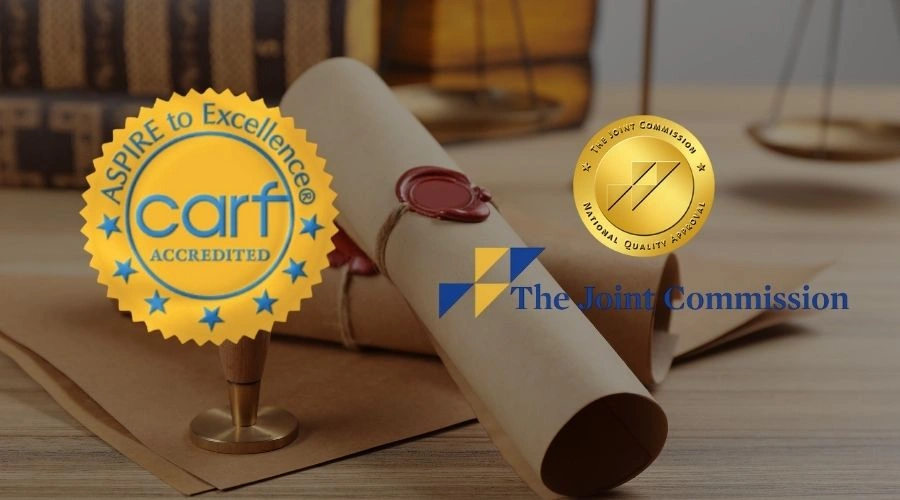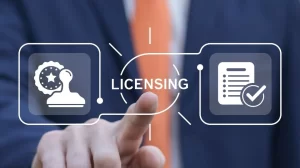How to Get Your Addiction Treatment Center Licensed Properly
Opening a substance abuse facility isn’t just about having the compassion and care to handle your clients; it’s also about licensure requirements, state regulations, and ensuring your initial application is correctly filled out. Public trust is another crucial element of any recovery residence, as clients seek reassurance that they will receive the necessary treatment services to navigate their recovery.
Facilities that offer substance abuse services for multiple areas of concern and a wide variety of therapeutic methods generally enjoy higher levels of success. However, before you can provide detoxification services, mental health counseling, or inpatient services, you have one critical hurdle to clear: state licensing.
So, do rehab facilities need to be licensed by the state? The short answer is yes, and skipping this level could shut down your substance abuse services facility.
This blog from our expert team at Ads Up Marketing examines the significance of licensure requirements, the governing bodies that oversee them, and strategies for avoiding the most common mistakes during the licensure process.
Does a Recovery Residence Require State Licensing?
The answer to the question above is yes. Nearly every substance abuse and mental health treatment center, whether it provides outpatient services or detoxification, must be licensed by the state in which it operates.
State licensing ensures that a facility:
- Protects clients’ well-being by making cleanliness, medical oversight, and ethical practices mandatory components of their programs.
- Meets minimum standards for safety, staffing, and all medical protocols.
- Operates in accordance with mental health regulations and client rights laws.
- Maintains a clean environment and adheres to the licensing requirements that keep facilities in compliance regarding emergency readiness and the right patient care models.
Operating without a license isn’t just a risk for your substance abuse facility. In most jurisdictions, failure to obtain the proper permits to run and administer mental health services is illegal.
An unlicensed business claiming to treat substance use disorders without a permit can face fines, forced closures, civil liability for injury, and even criminal charges if harm or fraud is involved.
Beyond the Legal Aspects of Non-Compliance
Proper licensing goes beyond legal issues. It demonstrates to clients and their families that your treatment facilities are credible, fulfill staffing requirements, and are approved to deliver treatment services.
Why Licensing Matters for Clients and Providers

Licensing protects everyone involved. For patients, it guarantees a basic level of safety and professionalism. For providers, it creates a structured operational environment for their treatment facilities, reducing compliance and reputational risks.
State licensing is so critical because:
- It protects patient welfare by requiring cleanliness at their facilities, stronger medical oversight, and ethical practice when compliance rules are satisfied.
- Authorizes insurance billing and reimbursement from Medicaid or any other insurance agency.
- Enables accreditation from national organizations, such as the Joint Commission or CARE.
- Enhances facilities by enhancing staff credibility through the verification of qualifications and background checks.
- Supports evidence-based treatment, documentation, and data security for facilities.
Without a license, even a well-meaning program can be mistaken for a scam that lacks certification. This can become a dangerous environment for those with substance use disorders seeking assistance.
Who Governs Rehab Licensing?
Each state is responsible for governing its facilities for substance use disorders. Most treatment providers fall under the regulations of a state-level agency, such as:
- The Department of Health
- Department of Human Services
- Behavioral Health and Substance Abuse Services Division
Some centers may also need to meet federal standards, especially if they:
- Accept Medicare or Medicaid for substance use disorders.
- Offer MAT (Medication-Assisted Treatment) using drugs like methadone or buprenorphine.
- Apply for SAMHA grants or other federal funding.
To ensure compliance, it is essential to consult both state and local licensing boards and understand the unique guidelines applicable to your specific region.
Types of Rehab Facility Licenses
Not all licenses cover everything needed to offer all treatment services legally. The specific services you plan to offer determine the licensure required to remain in compliance with each corresponding department.
Common facility types include:
Inpatient/Residential Treatment
This form of rehab offers full-time, overnight care with medical, therapeutic, and mental health services.
Outpatient and Intensive Outpatient (IOP) Treatment
These consist of daytime treatment providers, which allow clients to live off-site while completing their personalized recovery plans.
Detox Centers
At a rehab that offers treatment for detox, clients are medically monitored around the clock to manage their symptoms and keep them comfortable.
Dual Diagnosis Treatment
Dual diagnosis treats both mental health and substance use disorders simultaneously, reducing the chances of relapse by treating the underlying causes of addiction.
MAT Clinics
These facilities provide services that offer FDA-approved drug options for opioid or alcohol use disorder.
Most providers also need additional information regarding licensure for psychiatric care, specialized adolescent care, or transitional housing.
How to Get Your Rehab Facility Licensed Properly

Here’s a step-by-step breakdown of how to get licensed as an addiction treatment provider:
- Create a business plan and process. What does your service model look like? Start by clearly defining your client goals, demographics served, and care levels provided.
- Determine the following about your program:
- What services will you offer?
- Will your agency be inpatient, outpatient, or a mixture of both?
- Who is your target audience? Teens, adults, or veterans?
The stronger your business plan, the higher the odds that licensing bodies will have faith in your facility.
- Check state-specific requirements. Research the licensing body in your state, as requirements often vary, but include:
- Zoning and building codes
- Fire safety and occupancy permits
- Water and sanitation inspections
- Prepare your application. Compile the required documentation, which may include articles of incorporation or business registration, an organizational chart, staff resumes and background checks, facility floorplans and safety features, and policies and procedures manuals. You’ll also be required to have proof of liability insurance. Please note that accuracy and completeness are crucial, as any missing information can significantly delay the entire process.
- Apply and pay the fees. Once your materials are ready, submit them to the proper state agency along with the required fee. Please be aware that the processing period may range from 30 to 180 days.
- Prepare your facility for inspection. A professional inspection team could potentially:
- Review patient safety protocols
- Tour your rehab for cleanliness and compliance
- Evaluate medical storage and emergency systems
- Interview staff and examine records
Be sure to prepare well in advance and be as transparent as possible. Many rehabs fail inspection over minor oversights that could have been corrected ahead of time.
- Maintain ongoing compliance. Licensing isn’t a one-time task. Your center will need to:
- Pass regular re-inspections
- Submit annual reports or audits
- Maintain staff credentials and training logs
- Keep client records by HIPAA
- Non-compliance can lead to fines, suspension, or loss of licensure
Several Common Pitfalls to Avoid When Seeking Rehab Licensing for Your Facility

Even the most passionate treatment providers can make critical mistakes. Be mindful of the following regulations and whether they apply to you:
Research State-Specific Regulations
Failing to research state-specific rules before launch can impact the licensure procedure. Ensure you have all the proper documentation regarding the facility.
Using Unqualified Staff
Failure to use unqualified staff can spell disaster for your facility and the individual working illegally. All workers must be certified to administer treatment and present the appropriate documentation upon inspection.
Neglecting Zoning Requirements
Failure to adhere to zoning requirements can cause issues, mainly if the property is located near a residential area or if your facility is classified as a residential rehabilitation center.
Rushing the Inspection Process
Rushing the inspection process or making mistakes, such as forgetting required information on the application, can lead to expensive delays.
Skipping Accreditation
Failure to adhere to the accreditation process will limit your growth and access to a larger network of insurance providers.
Avoiding these costly but straightforward errors requires patience, due diligence, and professional legal or compliance support when you have questions.
Venturing Beyond Licensing: The Value of Accreditation

While state licensing is required, accreditation is optional. However, this certification is highly recommended. You can request accreditation from providers across the nation, like:
- CARF (Commission on Accreditation of Rehabilitation Facilities)
- The Joint Commission (formerly JCAHO)
- LegitScript (to advertise online, applies to using Google Ads)
Making requests from these providers can do the following for your organization:
- Build public trust
- Qualify your rehab for higher insurance reimbursement
- Demonstrate commitment to continuous improvement
- Improve internal policies and patient outcomes
Many government contracts and grant programs require accreditation, making it a wise long-term investment, even if it means revising some of your treatment center’s regulations.
Getting Help With State Compliance & Certification
Licensing a rehab facility isn’t only about checking boxes on a sheet of paper. The goal is to create a safe, ethical, and practical environment where people can recover with hope, dignity, and a positive outlook on the future.
However, it’s vital to remember that every facet of your operation matters, from zoning to staffing to inspections and accreditation–every step matters along the way.
Without a license, your facility risks shutdown, legal penalties, and failing to meet the needs of the group of clients you’re attempting to help. However, the proper preparation and guidance can help you launch a compliant and respected treatment center that truly makes a difference in the community.
Get Proven Support to Drive a Successful Facility
If you’re ready to take the next step in the compliance process, trust the professionals at Ads Up Marketing. We have decades of combined experience and can help you prepare for most segments of compliance and accreditation.
With a wealth of resources and a nationwide network of partners, we can ensure you’re ready to hit the ground running as a responsible, industry-leading facility with the proper certifications.
Free Digital Marketing Analysis




